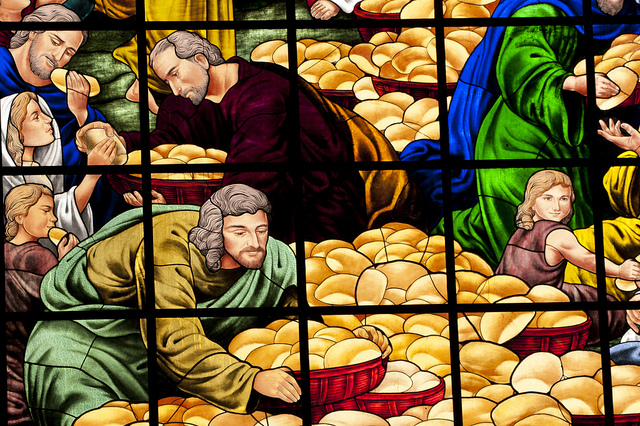I know what you are thinking, Dear Working Preachers. You are hoping that I am going to veer from the lectionary and offer a grand suggestion for a sermon series so as to bypass these five weeks in John six. Wishful thinking. A good try! But you know how much I like John.
Yet, it’s not just because I am in love with John that I am going to keep you in John. It’s because doing the hard work of dwelling in a text is necessary work as a preacher. If we are honest, how often do we avoid this kind of work? We can be quick to bale on biblical and theological depth. We skim the surface of texts looking for an interesting idea, a good story, a pithy quote, a memorable sound bite, using any of them as a jumping off point for all kinds of more “relevant” topics. And what is the result? What have we then communicated to our parishioners? The Bible isn’t really relevant at all. To dive deep into the possibilities of what a text might be revealing about God, about us? Well, that takes some doing. We don’t have time for that kind of tending to the text. We can’t possibly read that many commentaries. And we also have the propensity to set aside difficult texts. We know that difficult texts are not just those that seem difficult at first blush. Difficult texts are also those that appear to evade us theologically; those that we falsely deem uncomplicated, not a lot going on, and so we conclude that there is just not that much on which to preach; those that we just don’t “get,” casting them aside, relegating them to the island of misfit texts.
I think there is a certain logic to the Lectionary during the summer of Year B. It’s asking you to stay with one chapter in John for five weeks. It’s asking you to abide in the Word. Isn’t that exactly what the Gospel of John wants of you? To abide in the Word (John 8:31)? If you don’t do it for the Lectionary, do it for John.
Stick with me. We are going to walk through these next five weeks together, taking seriously the task of exegesis. We’ll dust off our exegetical tool box and look inside, reminding ourselves of those skills that we may have left behind because of the demands of ministry. We would do well to remember that according to John, the Word made flesh exegetes (exago) God — brings God out, leads God out so that we might experience God’s love with every sense we have (1:18). And isn’t that our purpose in preaching? To lead God out of a passage so that our parishioners can touch, taste, smell, see, and hear God? Aren’t the Greeks right? “Preacher, we wish to see Jesus” (12:21). Trust me. Our attentiveness to exegesis will pay off. We are going to give prolonged and detailed care to this chapter when it seems that Jesus keeps saying the same damn thing over and over again. Are you with me?
A critical strategy for preaching on the first of these five passages from John chapter six is to start by reading through the entire chapter. You have to know where this thing is going and then go back and reread the feeding miracle. What do you hear after hearing Jesus’ interpretation of the sign? What does Jesus want you to hear? What did you overlook? What did you downplay as not important? What do you want your congregation to pay attention to going forward? What themes do you want to lift up today to get them ready for the next five weeks?
It all starts with the feeding of the five thousand — the only miracle that appears in all four Gospels. Let’s review the basics according to John, each of which could be the focus for a sermon. First, Jesus himself feeds the five thousand. This detail would be overlooked were it not for the fact that the rest of the chapter will unpack what it means that Jesus himself is the bread of life. Second, it is on this sign, the fourth sign in the Gospel of John, that the entire rest of the chapter is based. That should be a moment for pause. The next four Sundays after this are Jesus interpreting, explaining this sign, just like he did in chapter five; just as he will in chapters nine and ten. We can easily misinterpret these signs. We could easily label the feeding of the five thousand as just another miracle. But the rest of chapter six is not random words from Jesus, but Jesus asking you to dwell in him and go deep into what it means that he is your bread for life. Third, it’s Passover. This is the second mention of Passover in the Gospel of John, three total (2:13; 6:4; 13:1), which is how we assume a three-year ministry for Jesus. And sure enough, that detail matters as Jesus presents himself as the bread from heaven. Fourth, there’s a lot of grass. Who cares? We start to care when we fast forward to another “I AM” statement in John, “I AM the good shepherd.” The sheep will be able to go in and out and find pasture so that they will have life and have it abundantly 10:10. All of a sudden, this is not the same feeding as found in Matthew, Mark, or Luke. Things have changed, and changed significantly.
You can do this. We can do this together. In the end, abiding in the Word is what it’s all about and we are promised that abundant life will be the sure result.
Karoline

